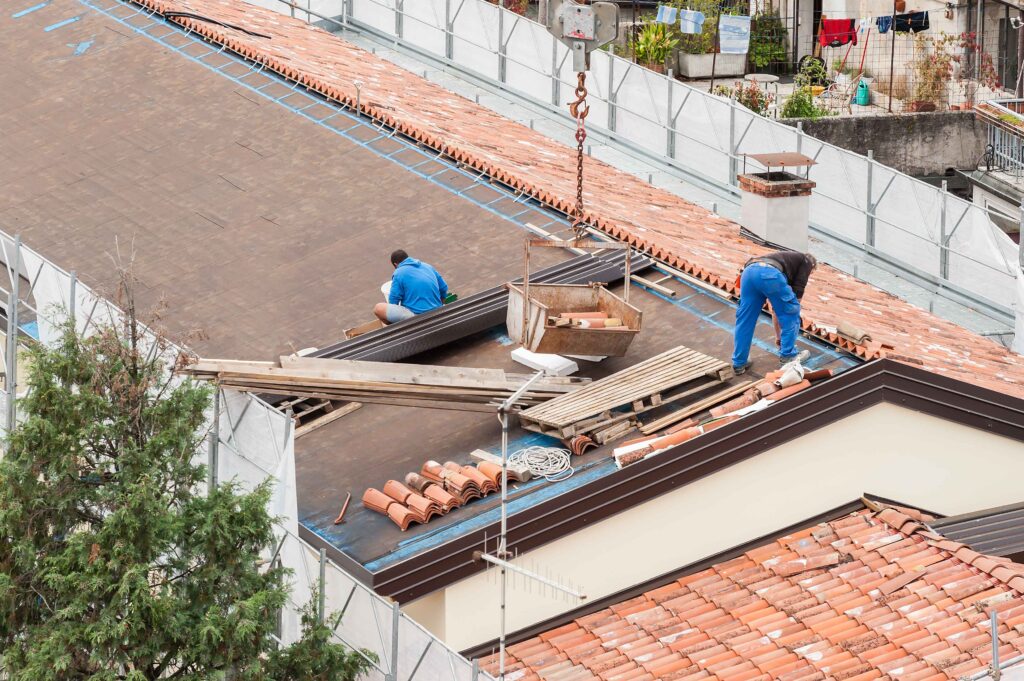- Serving London and surrounding areas
- Work for us

The UK’s ever-changing climate—marked by rain, frost, strong winds, and the occasional heatwave—demands durable, weather-resistant roofing. Choosing the best roofing materials for UK weather is essential for keeping your home safe, dry, and energy-efficient year-round. Whether you’re building new, repairing damage, or planning a roof replacement, understanding your material options is key.
Let’s explore the most reliable roofing materials for the UK climate and what makes each one suitable.
Natural slate is widely regarded as one of the best roofing materials for UK weather. It’s a traditional choice, especially in historic or period properties, and it offers exceptional longevity—often lasting over 100 years with proper maintenance.
Advantages:
Extremely durable and waterproof
Resistant to temperature changes, frost, and wind
Low-maintenance and eco-friendly
Adds a premium appearance to homes
Considerations:
Slate can be heavy, requiring strong roof structures. It’s also more expensive upfront, but the long-term savings make it worthwhile.
Clay and concrete tiles are both popular across the UK for their durability and affordability. They are widely available, easy to install, and can last between 40 and 80 years.
Advantages:
Excellent resistance to rain and frost
Available in a range of styles and colours
Suitable for a wide range of property types
Concrete tiles are slightly heavier but cheaper than clay, while clay tiles tend to be more colourfast and elegant.
Considerations:
Tiles can crack under extreme freeze-thaw cycles, so proper installation and periodic inspections are important.
While more common in North America, asphalt shingles are growing in popularity in the UK, especially for outbuildings or budget-friendly roofing projects.
Advantages:
Lightweight and easy to install
Cost-effective and quick to replace
Decent waterproofing for milder UK climates
Considerations:
Shingles have a shorter lifespan (around 20–30 years) and may not withstand strong wind and heavy storms as well as tile or slate options.
If your property has a flat or low-pitched roof, EPDM rubber roofing is a top contender. It’s particularly effective in resisting the heavy rainfall and pooling water common in the UK.
Advantages:
Waterproof and long-lasting (up to 50 years)
Flexible and UV-resistant
Minimal maintenance required
Great for extensions, garages, or commercial buildings
Considerations:
EPDM is not the most attractive finish, so it’s best suited for areas where appearance is less critical.
Another excellent flat roofing material is GRP (Glass Reinforced Plastic). Its seamless application makes it highly resistant to leaks and weathering.
Advantages:
Fully waterproof with a seamless finish
Highly resistant to moss, rot, and frost
Can last 30+ years with minimal upkeep
Considerations:
Installation must be done in dry conditions, and poor workmanship can affect performance. It’s typically more expensive than felt or rubber alternatives but offers better longevity.
Felt remains a common choice for sheds, garages, and temporary flat roof coverings. Modern felt systems are more advanced and can provide reliable protection when installed correctly.
Advantages:
Very cost-effective
Suitable for smaller or temporary structures
Easy to repair and replace
Considerations:
Shorter lifespan (10–15 years), more vulnerable to UV and mechanical damage than EPDM or GRP.
When choosing the best roofing materials for UK weather, always consider:
Water Resistance: Frequent rain requires strong waterproofing.
Wind Resistance: Choose materials that can stay put during storms.
Frost & Freeze Protection: UK winters can be harsh; pick materials that won’t crack or degrade in frost.
Longevity: A long-lasting material may cost more initially but saves money over time.
Aesthetic Suitability: Match your material to your property’s architectural style.
There’s no one-size-fits-all answer, but here’s a quick summary:
| Material | Best For | Lifespan |
|---|---|---|
| Slate | Period homes, premium builds | 100+ years |
| Clay/Concrete Tiles | Most UK homes, affordability | 40–80 years |
| Asphalt Shingles | Budget-conscious projects | 20–30 years |
| EPDM Rubber | Flat roofs, extensions | 30–50 years |
| GRP Fibreglass | Flat roofs, seamless finish | 30+ years |
| Felt | Garages, sheds | 10–15 years |
Consult with a local roofing professional to assess your roof’s needs, especially in areas prone to harsh weather conditions.
Need expert advice on your roofing options? Whether you’re repairing, upgrading, or building from scratch, our team can help you choose the best solution for long-term performance and peace of mind.
Monday to Sunday: 6:00 AM – 8:00 PM (Open Daily)
Subscribe to our newsletter for the latest updates and offers.
© [2010 [A&A Roofing]. All Rights Reserved. Designed By Spectrum Media Solutions.